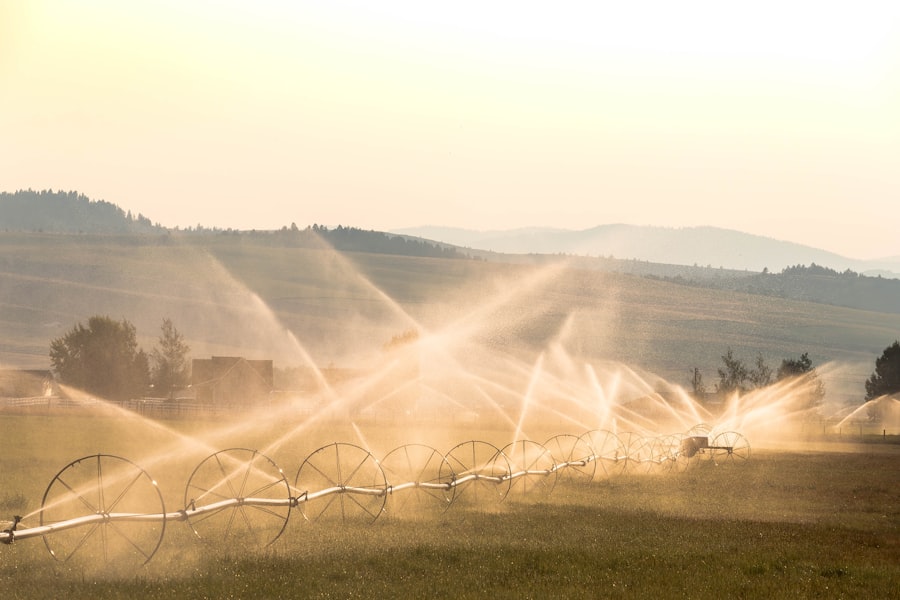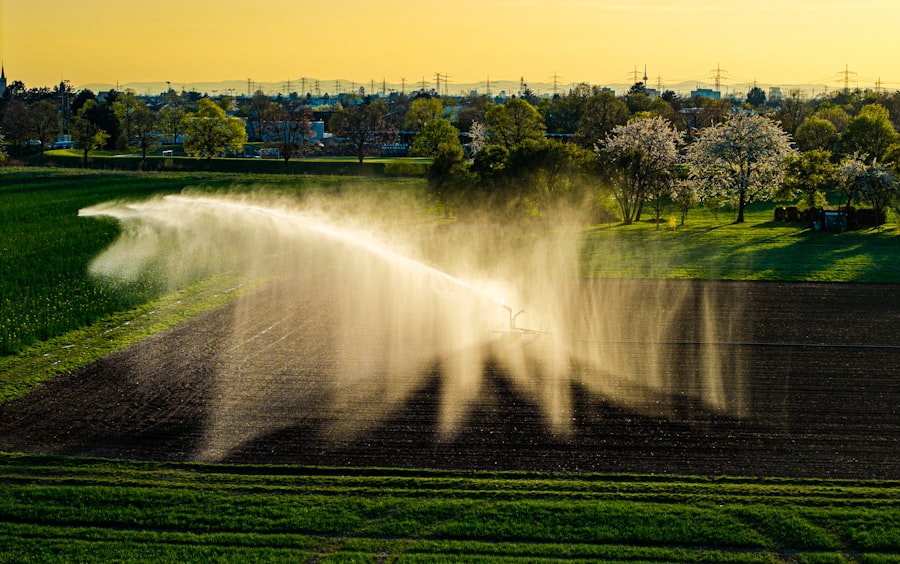The history of farmland water rights is deeply intertwined with the development of agriculture itself.
In ancient civilizations, such as those in Mesopotamia and Egypt, water rights were often governed by local customs and religious practices.
These early systems laid the groundwork for more formalized water rights, as communities recognized the necessity of managing this vital resource to sustain agricultural productivity. Over the centuries, various legal frameworks emerged to address the complexities of water allocation. In the United States, for instance, the doctrine of prior appropriation took root in the western states during the 19th century.
This principle established that water rights were granted based on the first person to divert water for beneficial use. Conversely, riparian rights, which originated in English common law, allowed landowners adjacent to a water source to use it as long as it did not harm other users. These contrasting systems reflect the diverse approaches societies have taken to manage water resources, highlighting the historical significance of farmland water rights in shaping agricultural practices.
Key Takeaways
- Farmland water rights have a long history, dating back to ancient civilizations and evolving through various legal and regulatory frameworks.
- Speculation plays a significant role in farmland water rights, leading to increased competition and higher prices for water resources.
- Small-scale farmers are disproportionately impacted by farmland water rights, facing challenges in accessing and affording water for their agricultural needs.
- The environmental consequences of farmland water rights speculation include depletion of aquifers, degradation of water quality, and harm to ecosystems.
- Government regulation and ethical considerations are crucial in addressing the complex issues surrounding farmland water rights, including the intersection with indigenous rights and the global perspective on water access.
The Role of Speculation in Farmland Water Rights
Speculation has emerged as a significant force in the realm of farmland water rights, particularly in regions facing increasing water scarcity. Investors and corporations often purchase water rights with the expectation that their value will appreciate over time. This speculative behavior can lead to inflated prices, making it difficult for small-scale farmers to access essential water resources.
As water becomes a commodity, the focus shifts from its intrinsic value as a life-sustaining resource to its potential for profit, creating a complex dynamic that can exacerbate existing inequalities in agricultural communities. Moreover, speculation in farmland water rights can lead to a disconnect between water availability and actual agricultural needs. When investors acquire large quantities of water rights without any intention of using them for farming, they contribute to a market that prioritizes profit over sustainability.
This practice can result in over-extraction of water resources, further straining ecosystems and diminishing the long-term viability of agriculture in affected areas. The interplay between speculation and farmland water rights raises critical questions about the future of food production and environmental stewardship.
The Impact of Farmland Water Rights on Small-scale Farmers

Small-scale farmers often find themselves at a disadvantage in the competitive landscape shaped by farmland water rights. As larger agricultural enterprises and investors acquire significant water allocations, smaller operations struggle to secure the resources necessary for their livelihoods. This disparity can lead to a cycle of marginalization, where small farmers are forced to either sell their land or abandon their agricultural practices altogether.
The loss of these farms not only impacts individual families but also threatens the diversity and resilience of local food systems. Additionally, the rising costs associated with acquiring water rights can deter new entrants into farming, stifling innovation and reducing competition within the agricultural sector. Small-scale farmers often rely on traditional methods and local knowledge to cultivate their crops, but without access to adequate water resources, their ability to sustain these practices diminishes.
The implications extend beyond economic concerns; they also touch on cultural heritage and community identity, as farming traditions are passed down through generations. The erosion of small-scale farming due to inequitable access to water rights poses a significant challenge to maintaining vibrant rural communities.
The Environmental Consequences of Farmland Water Rights Speculation
| Environmental Consequences | Farmland Water Rights Speculation |
|---|---|
| Depletion of Aquifers | Increased pumping of groundwater |
| Soil Degradation | Over-irrigation leading to salinization |
| Loss of Biodiversity | Conversion of natural habitats to farmland |
| Water Pollution | Runoff of fertilizers and pesticides |
The environmental consequences of speculation in farmland water rights are profound and far-reaching. As investors prioritize profit over ecological balance, the over-extraction of water can lead to severe degradation of natural ecosystems. Rivers and aquifers that once supported diverse flora and fauna may experience diminished flow or even complete depletion, resulting in habitat loss and biodiversity decline.
The ripple effects extend beyond immediate ecosystems; entire watersheds can be altered, impacting not only wildlife but also human communities that rely on these resources for drinking water and recreation. Furthermore, speculative practices can exacerbate climate change impacts on agriculture. As droughts become more frequent and severe due to changing weather patterns, the competition for limited water resources intensifies.
This situation creates a precarious environment for farmers who depend on consistent water availability for crop production. The environmental degradation resulting from speculation not only threatens agricultural sustainability but also raises ethical questions about the stewardship of natural resources. The need for a balanced approach that considers both economic interests and environmental health has never been more urgent.
The Legal Framework of Farmland Water Rights
The legal framework governing farmland water rights varies significantly across regions and countries, reflecting local customs, historical practices, and regulatory environments. In many jurisdictions, laws are designed to allocate water based on established principles such as prior appropriation or riparian rights. However, these frameworks often struggle to adapt to contemporary challenges posed by climate change, population growth, and increasing competition for limited resources.
As a result, many legal systems are under pressure to evolve in order to address the complexities of modern water management. In recent years, there has been a growing recognition of the need for comprehensive reforms that prioritize sustainability and equitable access to water resources. Some regions have begun implementing policies that promote collaborative management approaches, involving stakeholders from various sectors in decision-making processes.
These initiatives aim to balance agricultural needs with environmental protection and community interests. However, achieving meaningful reform requires navigating a complex landscape of legal precedents, vested interests, and competing priorities—a challenge that underscores the importance of ongoing dialogue and collaboration among all stakeholders involved in farmland water rights.
The Economic Implications of Farmland Water Rights Speculation

The economic implications of speculation in farmland water rights are multifaceted and can have lasting effects on agricultural markets and rural economies. As investors drive up prices for water allocations, small-scale farmers may find themselves unable to compete, leading to consolidation within the agricultural sector. This trend can result in fewer farms operating within a given region, diminishing local food production capacity and increasing reliance on larger agribusinesses that may prioritize profit over community needs.
Moreover, speculation can create volatility in agricultural markets as fluctuations in water availability directly impact crop yields and prices. When investors hold significant quantities of water rights without utilizing them for productive purposes, it can lead to artificial scarcity that disrupts supply chains and drives up costs for consumers. This dynamic not only affects farmers but also has broader implications for food security and access to affordable nutrition within communities.
The economic landscape shaped by farmland water rights speculation necessitates careful consideration of policies that promote equitable access while ensuring sustainable agricultural practices.
The Role of Government Regulation in Farmland Water Rights
Government regulation plays a crucial role in shaping the landscape of farmland water rights and addressing the challenges posed by speculation. Regulatory frameworks are essential for establishing clear guidelines regarding water allocation, usage, and conservation practices. Effective governance can help mitigate the negative impacts of speculation by promoting transparency and accountability within water markets.
By implementing policies that prioritize equitable access to water resources, governments can support small-scale farmers while safeguarding environmental sustainability. In recent years, some governments have begun exploring innovative regulatory approaches aimed at enhancing resilience within agricultural systems. For instance, programs that incentivize conservation practices or promote collaborative management among stakeholders have gained traction in various regions.
These initiatives recognize that sustainable water management requires collective action and shared responsibility among all users. However, achieving effective regulation necessitates ongoing engagement with local communities and stakeholders to ensure that policies reflect their needs and priorities.
The Ethical Considerations of Farmland Water Rights Speculation
The ethical considerations surrounding farmland water rights speculation raise important questions about justice, equity, and responsibility toward future generations. As investors prioritize profit over community well-being, issues of fairness arise regarding access to essential resources like water. The commodification of water can lead to situations where those who need it most—small-scale farmers and marginalized communities—are left without adequate access while speculators profit from their misfortune.
Furthermore, ethical considerations extend beyond immediate economic impacts; they also encompass broader societal values related to environmental stewardship and intergenerational equity. The decisions made today regarding farmland water rights will have lasting consequences for future generations who will inherit both the benefits and burdens of current practices. Engaging in ethical discourse around these issues is essential for fostering a more just and sustainable approach to managing one of humanity’s most vital resources.
The Intersection of Farmland Water Rights and Indigenous Rights
The intersection of farmland water rights and Indigenous rights presents a complex landscape marked by historical injustices and ongoing struggles for recognition and sovereignty. Many Indigenous communities have long-standing relationships with their ancestral lands and waters, often predating colonial legal frameworks that sought to regulate these resources without their consent. As speculation drives up demand for water rights, Indigenous peoples frequently find themselves marginalized in discussions about resource allocation.
Efforts to address these disparities have gained momentum in recent years as Indigenous voices advocate for recognition of their inherent rights to land and water. Collaborative approaches that involve Indigenous knowledge systems alongside scientific research have shown promise in promoting sustainable resource management practices that honor traditional ecological wisdom. However, achieving meaningful reconciliation requires not only legal recognition but also a commitment from all stakeholders to engage in respectful dialogue and partnership with Indigenous communities.
The Global Perspective on Farmland Water Rights
The issue of farmland water rights is not confined to any single region; it is a global concern that transcends borders and cultures.
Countries facing severe droughts or over-extraction challenges are grappling with how best to allocate water rights while ensuring food security and environmental sustainability.
International organizations have begun addressing these challenges through collaborative initiatives aimed at promoting best practices in water governance. By sharing knowledge and experiences across borders, countries can learn from one another’s successes and failures in managing farmland water rights effectively. However, achieving global cooperation requires navigating complex political landscapes and recognizing diverse cultural perspectives on resource management—a task that demands ongoing commitment from all stakeholders involved.
The Future of Farmland Water Rights: Challenges and Opportunities
The future of farmland water rights is fraught with challenges but also presents opportunities for innovation and collaboration. As climate change continues to alter precipitation patterns and exacerbate existing water scarcity issues, stakeholders must adapt their approaches to resource management accordingly. Embracing sustainable practices such as rainwater harvesting, efficient irrigation technologies, and regenerative agriculture can help mitigate some of these challenges while promoting resilience within agricultural systems.
Moreover, fostering dialogue among diverse stakeholders—including farmers, policymakers, Indigenous communities, and environmental advocates—can lead to more equitable solutions that prioritize both human needs and ecological health. By recognizing the interconnectedness of social justice, environmental sustainability, and economic viability within discussions about farmland water rights, society can work toward a future where access to this vital resource is equitable and sustainable for generations to come. In conclusion, the complexities surrounding farmland water rights necessitate ongoing examination from multiple perspectives—historical, legal, economic, ethical—and require collaborative efforts among all stakeholders involved in resource management.
By addressing these challenges head-on while embracing opportunities for innovation and cooperation, society can strive toward a more just and sustainable future for agriculture and its vital relationship with water resources.
In recent years, the speculation surrounding farmland water rights has become a hot topic among investors and environmentalists alike. This issue is intricately linked to the broader dynamics of land ownership and resource management, as highlighted in a related article on How Wealth Grows. The article delves into the complexities of water rights as a financial asset and its implications for sustainable agriculture. For a deeper understanding of how these factors interplay, you can read more about it on How Wealth Grows. This resource provides valuable insights into the economic and environmental impacts of water rights speculation, offering a comprehensive overview of the challenges and opportunities in this evolving landscape.
WATCH THIS! 🫣Why Wall Street Is Buying Up America’s Farmland (And Why It Should Terrify You)
FAQs
What is farmland water rights speculation?
Farmland water rights speculation refers to the practice of purchasing water rights associated with agricultural land for the purpose of reselling or leasing them for a profit, rather than using the water for farming.
How does farmland water rights speculation work?
Farmland water rights speculation typically involves purchasing water rights from farmers or other landowners and then either reselling the rights to other parties or leasing them out for a profit. This can result in the water being diverted from agricultural use to other purposes.
What are the potential impacts of farmland water rights speculation?
Farmland water rights speculation can have significant impacts on local agricultural communities, as it can result in the loss of water resources for farming and increased competition for water. This can lead to higher water prices for farmers and reduced agricultural productivity.
Is farmland water rights speculation legal?
The legality of farmland water rights speculation varies by jurisdiction. In some areas, there are regulations in place to limit or prevent the speculative buying and selling of water rights. However, in other areas, the practice may be allowed with few restrictions.
What are some examples of farmland water rights speculation?
One example of farmland water rights speculation is the purchase of water rights in drought-prone regions with the intention of reselling the rights at a higher price during times of water scarcity. Another example is the leasing of water rights to industries or municipalities for non-agricultural use.
